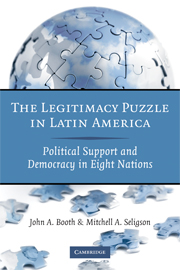Book contents
- Frontmatter
- Contents
- List of Figures
- List of Tables
- Preface
- 1 The Legitimacy Puzzles
- 2 The Structure of Legitimacy
- 3 Countries in the Study
- 4 The Sources of Political Legitimacy
- 5 Legitimacy and Political Participation
- 6 Legitimacy and Negative Political Capital
- 7 Legitimacy and Democratic Values
- 8 The Sky Is Not Falling: The Puzzle Solved
- Appendix A Supporting Data and Analyses for Chapters 1–5
- Appendix B Variables Used in the Analyses
- Appendix C System-level Performance Measures
- Appendix D Nonsampling Errors, Sampling Errors, and Design Effects for the Eight-Nation Survey
- Appendix E Method of Constructing the Legitimacy Factor Scores
- References
- About the Authors
- Index
Appendix D - Nonsampling Errors, Sampling Errors, and Design Effects for the Eight-Nation Survey
Published online by Cambridge University Press: 05 June 2012
- Frontmatter
- Contents
- List of Figures
- List of Tables
- Preface
- 1 The Legitimacy Puzzles
- 2 The Structure of Legitimacy
- 3 Countries in the Study
- 4 The Sources of Political Legitimacy
- 5 Legitimacy and Political Participation
- 6 Legitimacy and Negative Political Capital
- 7 Legitimacy and Democratic Values
- 8 The Sky Is Not Falling: The Puzzle Solved
- Appendix A Supporting Data and Analyses for Chapters 1–5
- Appendix B Variables Used in the Analyses
- Appendix C System-level Performance Measures
- Appendix D Nonsampling Errors, Sampling Errors, and Design Effects for the Eight-Nation Survey
- Appendix E Method of Constructing the Legitimacy Factor Scores
- References
- About the Authors
- Index
Summary
Every survey that uses a sample of respondents rather than the entire population of possible respondents (i.e., the “universe”) is affected by two types of error: nonsampling and sampling errors. Both are important and affect the accuracy of the results, but only the sampling errors can be quantified. Nonsampling errors, namely, those that are made during the collection and processing of data, are ones that researchers can attempt to minimize. In this study, we made every attempt to control nonsampling errors. We did extensive pretesting of the survey instrument to help improve comprehension on the part of the respondents. In the end, we produced 23 major redrafts and many more minor drafts before we began the surveys. Good training of interviewers helps ensure uniform application of the questionnaire. Supervision of fieldwork reduces nonsampling error, as it helps to ensure that interviews are carried out according to the standards established by the researchers. Careful coding and checking of coding helps ensure that errors are minimized. A clean database was achieved by utilizing data entry software that had built-in range codes, so that “wild codes” were not possible; in addition, double entry by different data entry clerks was used to check for typing errors made during the data entry process.
Sampling errors stem from the fact that only a sample is interviewed, not the whole population. Sampling error is the measure of variability among all the possible samples that could be employed using the same technique.
- Type
- Chapter
- Information
- The Legitimacy Puzzle in Latin AmericaPolitical Support and Democracy in Eight Nations, pp. 301 - 304Publisher: Cambridge University PressPrint publication year: 2009



